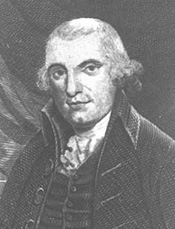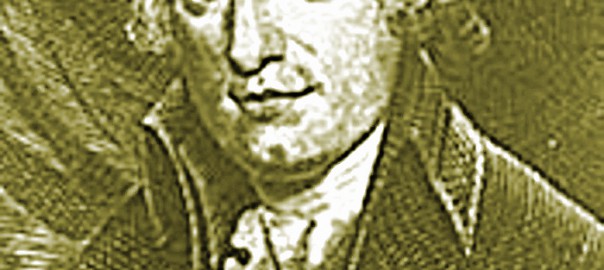
Elhanan Winchester was born in Massachusetts, USA, in 1751. He was raised in a Congrationalist setting but after a conversion experience he joined a Free Will (General) Baptist church in which he became a preacher. Winchester seems to gradually have become convinced of a High Calvinist theology in the vein of John Gill, and, after renouncing Arminianism, Winchester became a minister in a Calvinistic (Particular) Baptist church, first in Bellingham (MA) and then in Welsh Neck (SC).
After a friend of Winchester’s in 1778 brought the English edition of The Everlasting Gospel to Welsh Neck, Winchester became convinced of universalism. Later Winchester would make contact to the German Baptists of Germantown and he would write the foreword for a later edition of The Everlasting Gospel which he published in London in 1792. In the foreword to this edition Winchester noticed that:
The system held out in the following pages appears to me the only one that in the least bids fair to unite the two great bodies of Christians, that have so long and so bitterly opposed each other, viz. those who assert that Christ died for all, and yet that there shall be but few, comparatively, that shall finally derive any saving benefit therefrom; and those who assert that all for whom the savior died shall indeed be saved, but that he died only for a few.
Winchester notes that it seems highly unlikely that either of these sects should change their principles. The one charges the other with a lack of benevolence while the other charges the one with lacking a proper view on the omnipotence of God. For a reconciliation to take place between these two opinions, it must be ‘on some middle ground where both may meet without giving up their favorite opinions’, says Winchester. Such a middle ground is exactly what ‘the system of the Universal Restoration’ offers. As soon as the doctrines of Universal Restoration are accepted, says Winchester, it will bring reconciliation between the two opposing bodies of doctrines in Christian theology.
In the years following Winchester’s profession of universalism he and his congregation would experience exclusion and marginalization from the broader evangelical community which would eventually lead to the foundation of an independent Universal Baptist church. In 1782 Winchester addressed this issue in a sermon delivered at the University in Philadelphia. The sermon was later printed with the title The Outcasts Comforted: A SERMON Delivered at the University in Philadelphia, January 4, 1782 To the Members of the BAPTIST CHURCH, who have been rejected by their Brethren, For holding the Doctrine of the final Restoration of all Things. Winchester argues in the sermon that it is strange that the Universal Baptists are looked upon as heretics when they only affirm the doctrines already held by others:
I have often considered it with astonishment, that two ministers shall preach, and prove what they say from the scriptures, and neither of them shall be looked upon as holding damnable heresy, and yet we shall be looked upon as the worst of heretics by both of them, and all their people, for believing only what both of them put together have asserted.
The counsel of God shall stand and he will perform his pleasure, notwithstanding all the opposition that men can make, says Winchester with reference to Isaiah (Isaiah 46. 10). If God will have all men to be saved, as we hear in the first epistle to Timothy (1 Timotheus 2. 4) and if God is determined to perform his pleasure and if nothing is impossible with God, as stated in Luke 1. 37, then ‘is not the doctrine of the Restoration true?’, Winchester asks rhetorically.
Elhanan Winchester, The Universal Restoration: exhibited in a series of dialogues between a minister and his friend: comprehending the substance of several conversations that the author hath had with various persons, both in America and Europe, on that interesting subject, wherein the most formidable objections are stated and fully answered (UR) (London: Gillet, 1788).
Elhanan Winchester, The Outcasts Comforted. A sermon delivered at the University of Philadelphia, January 4, 1782 (Philadelphia: Towne, 1782).
